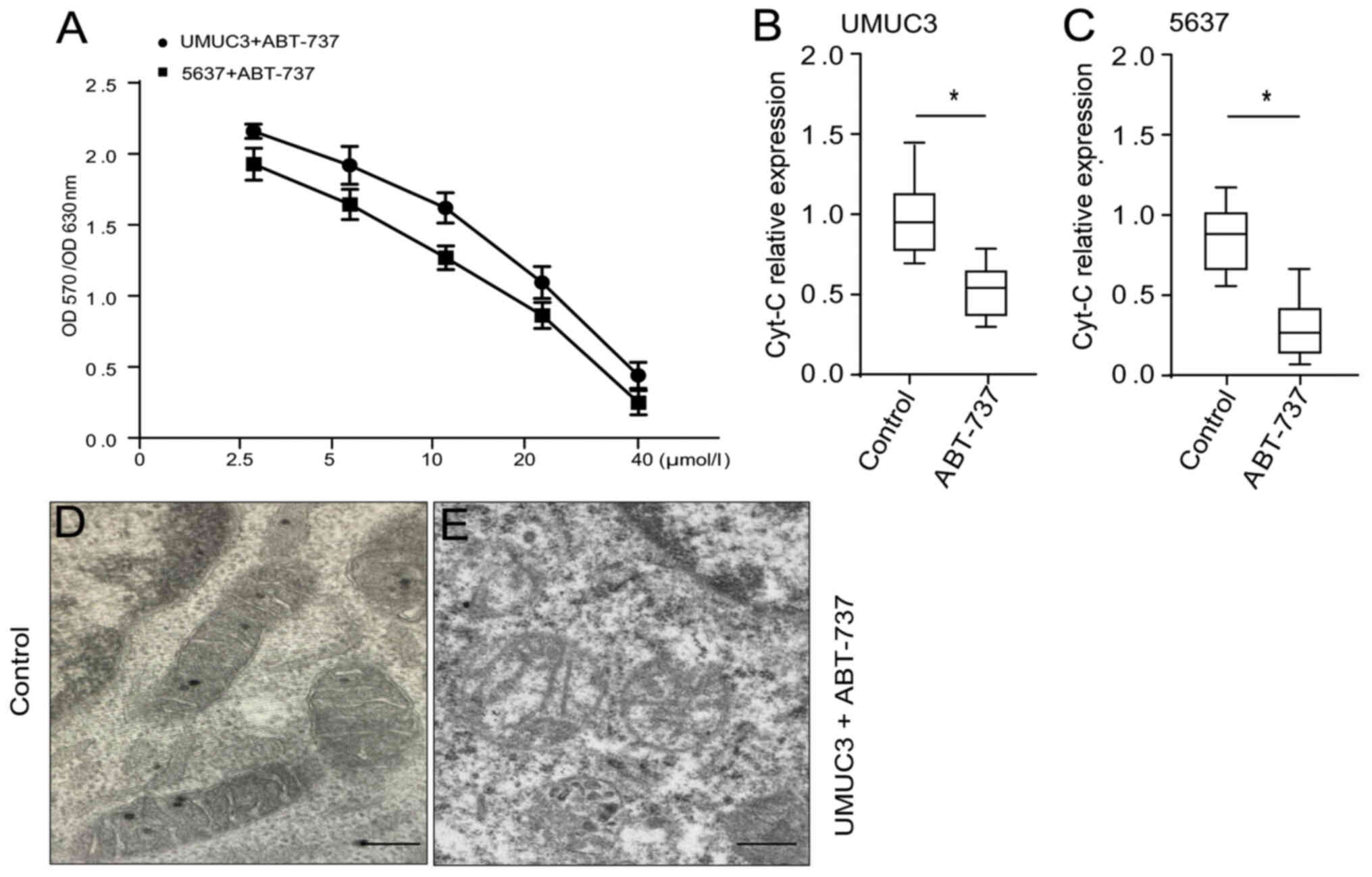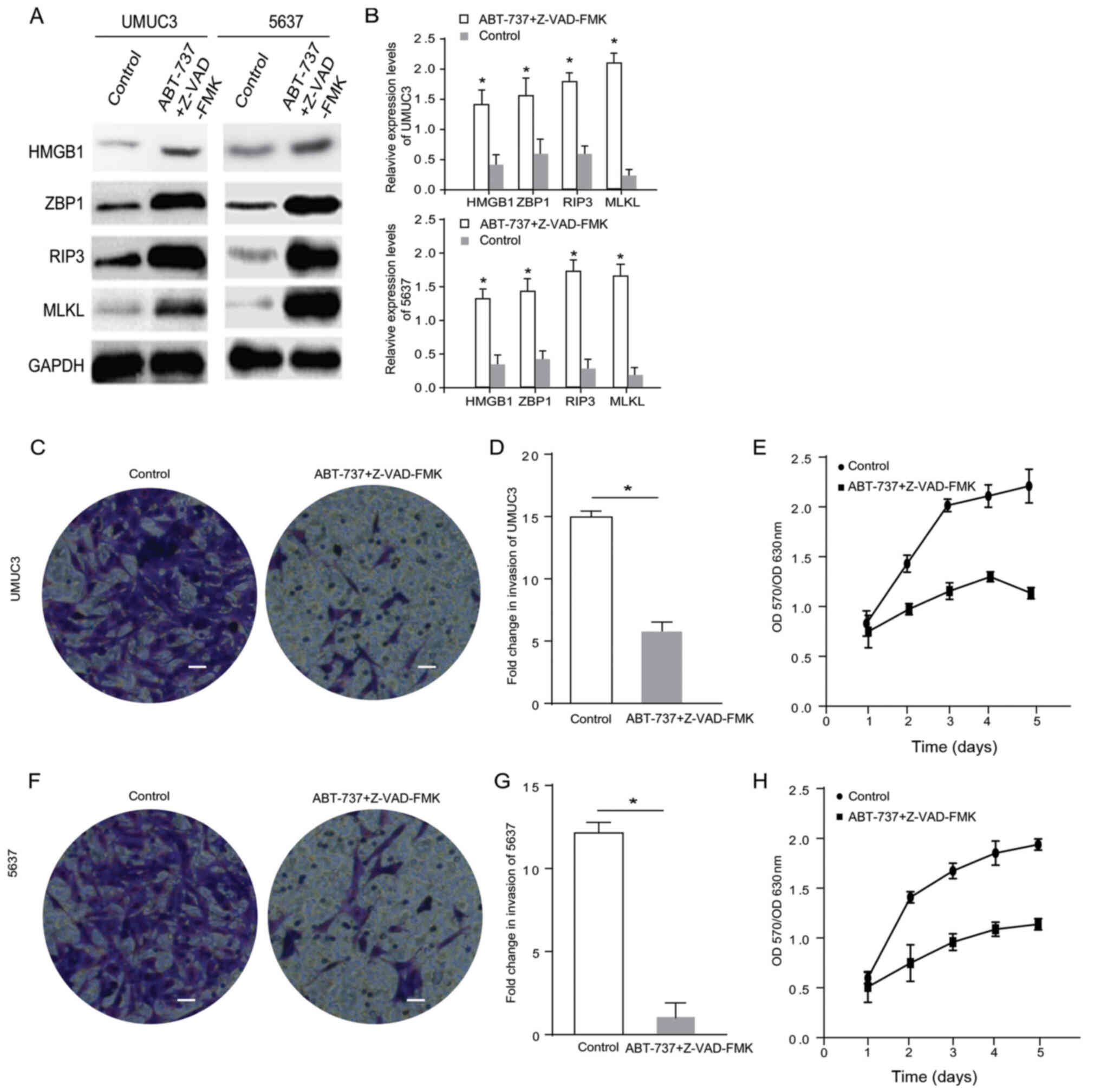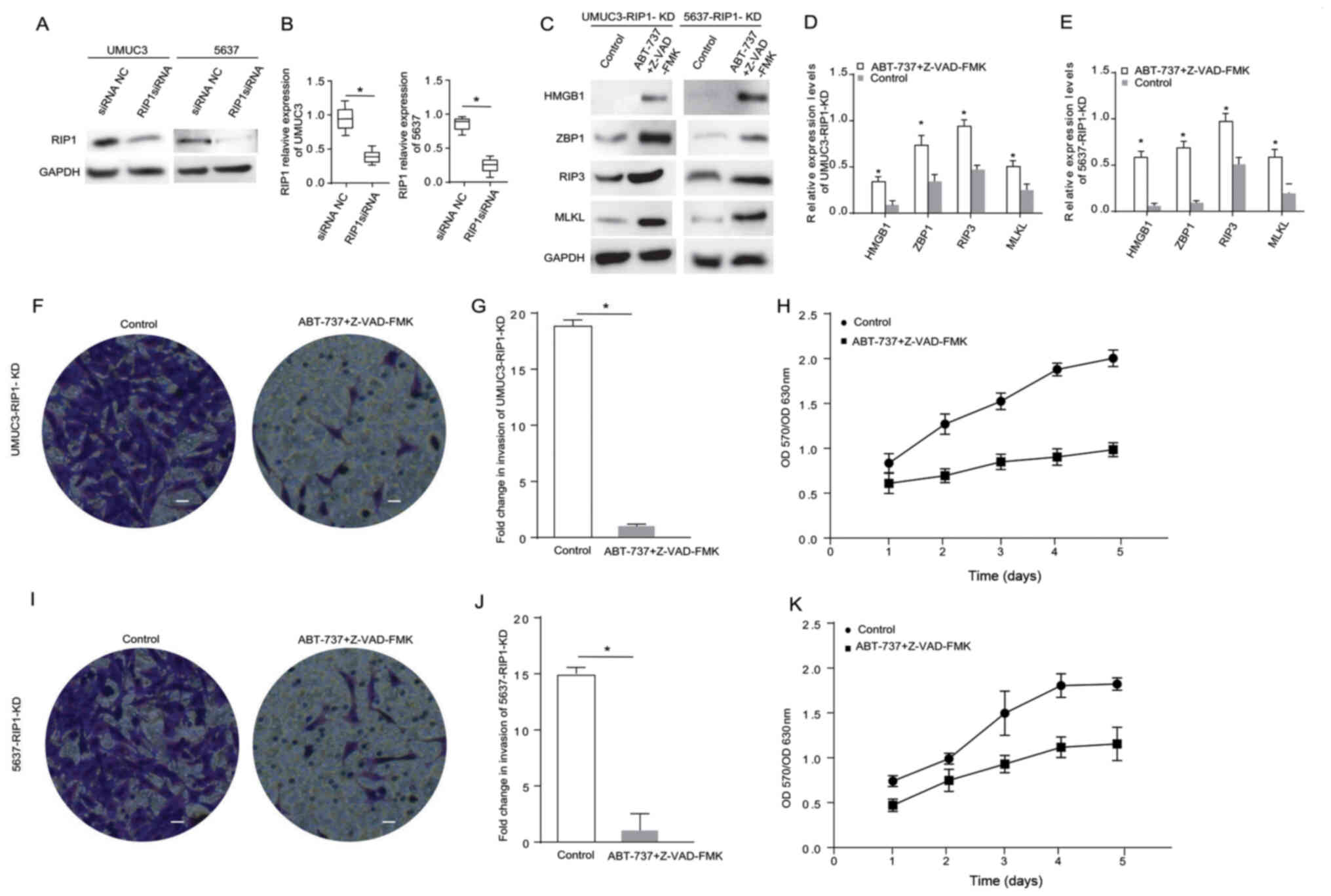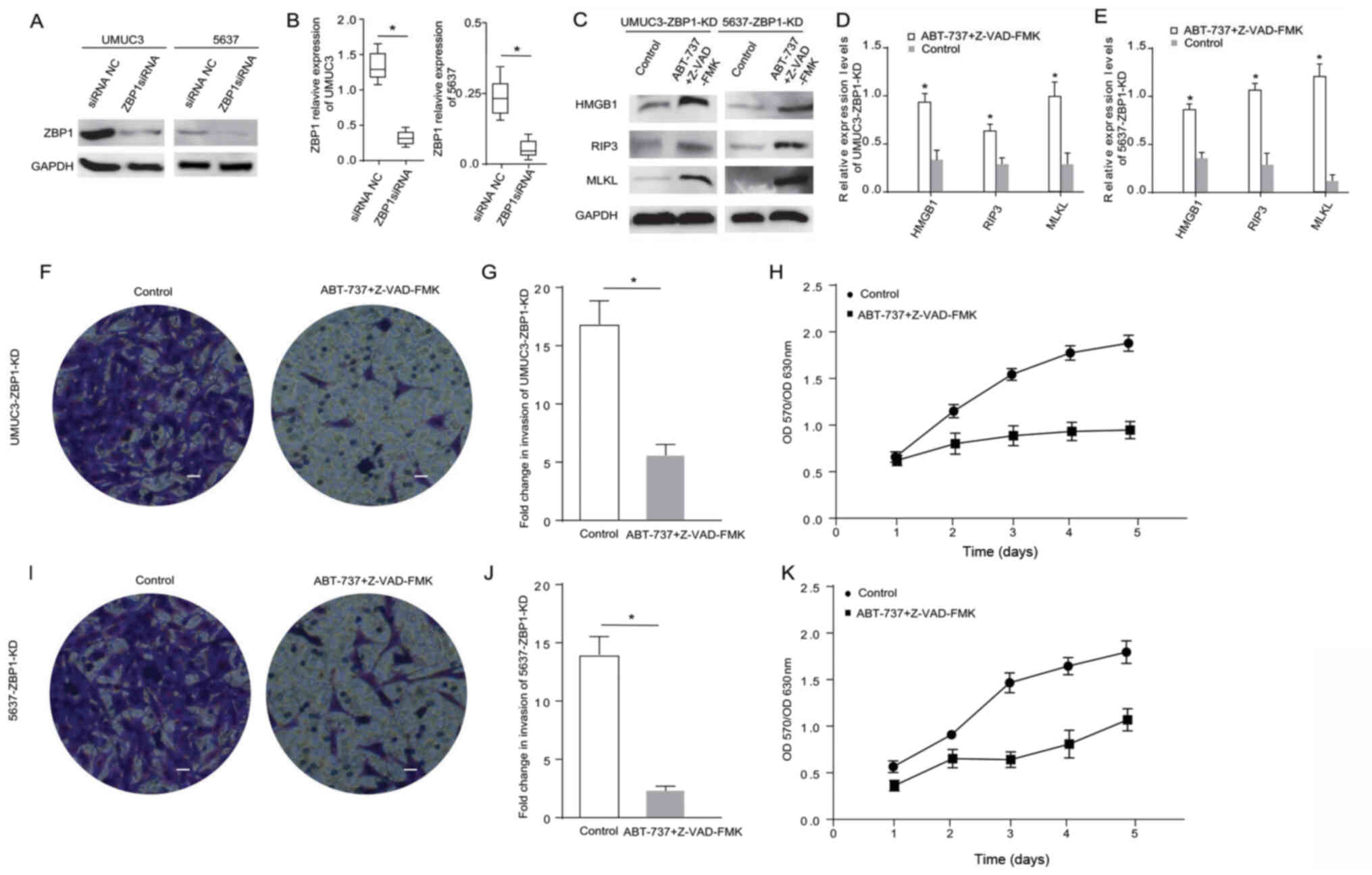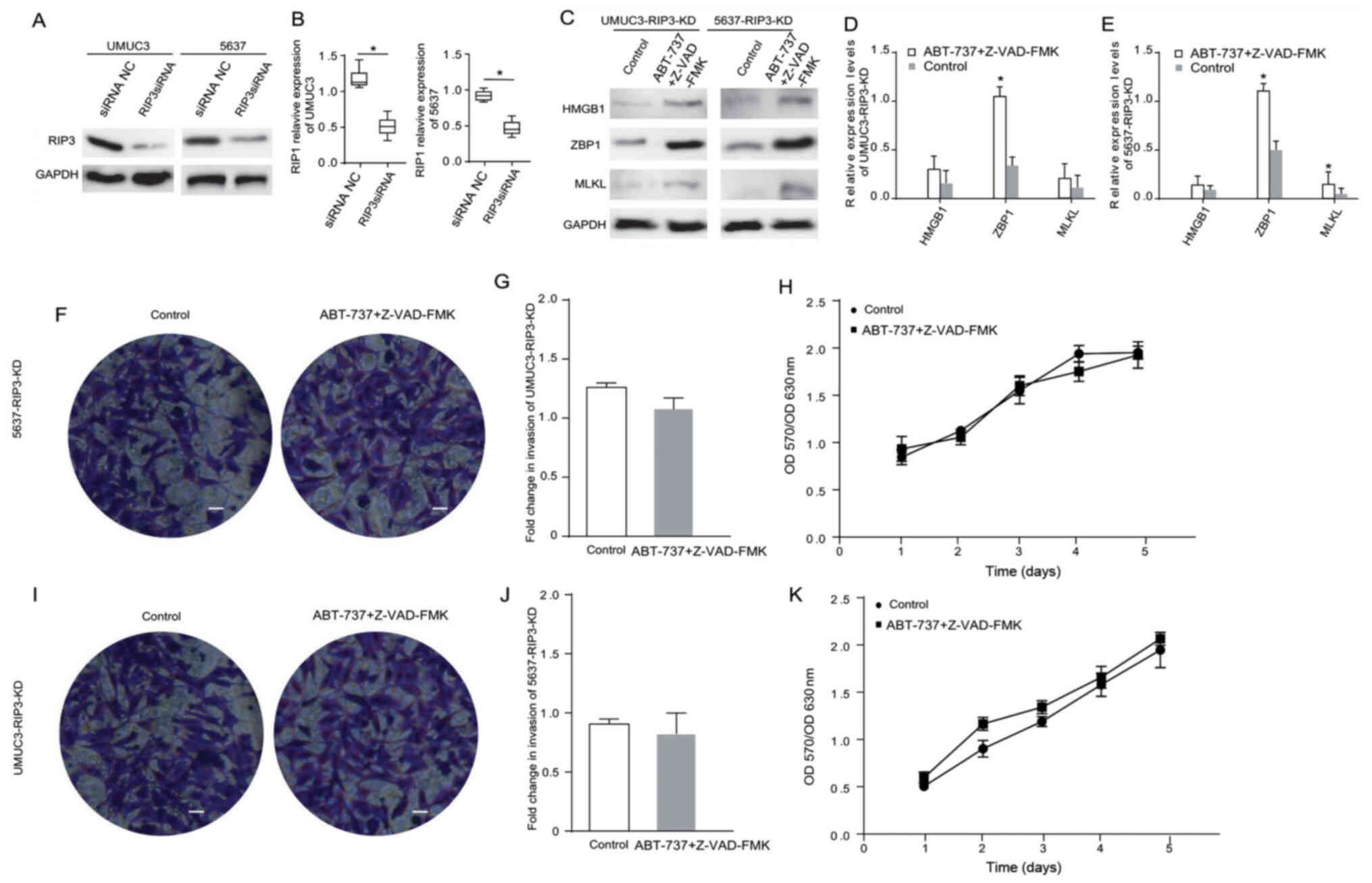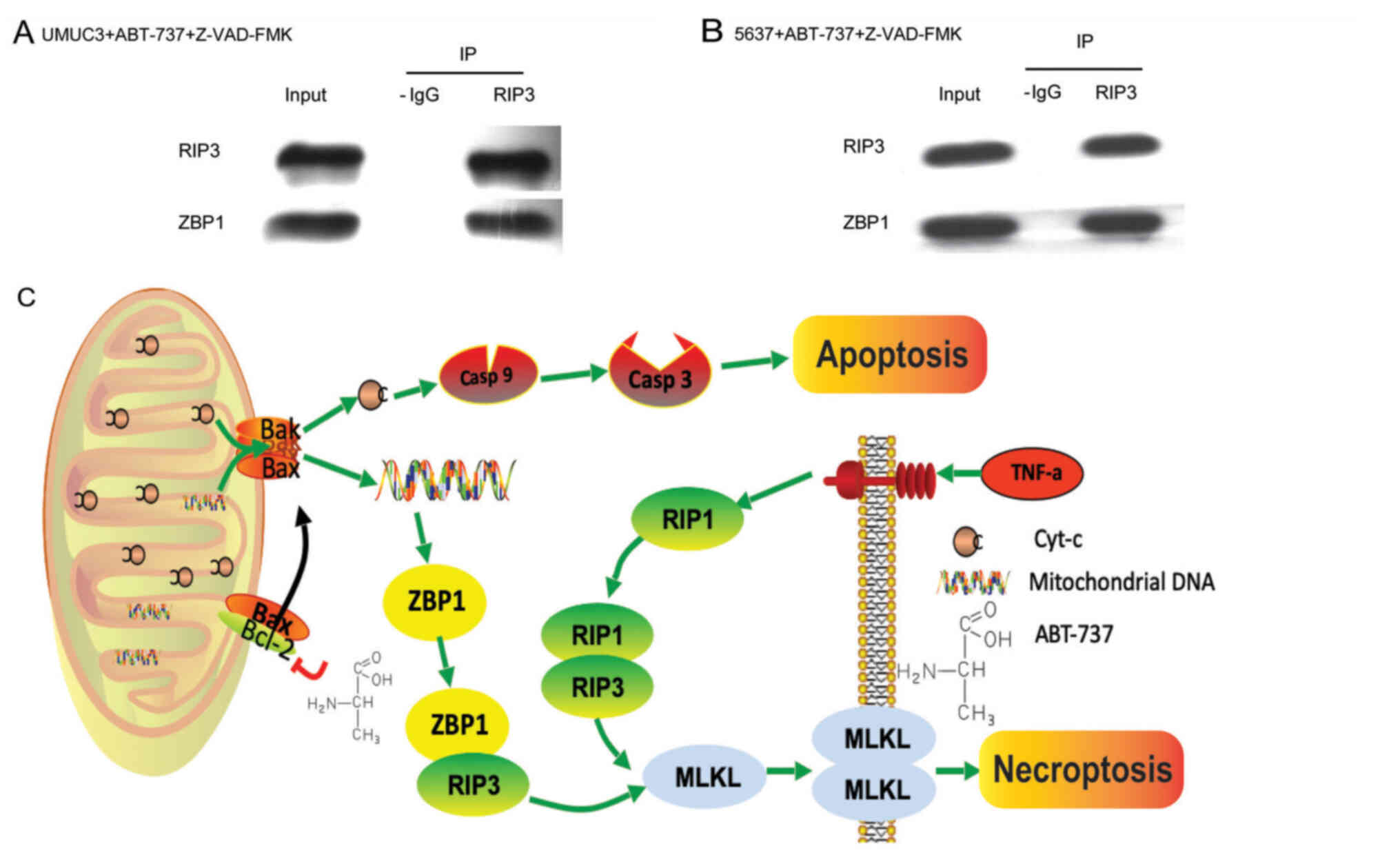|
1
|
Sasaki T, Kojima S and Kubodera A: Renal
gallium accumulation in mice with acute immune complex
glomerulonephritis. Int J Nucl Med Biol. 12:103–110. 1985.
View Article : Google Scholar : PubMed/NCBI
|
|
2
|
Gupta M, Kates M and Bivalacqua TJ:
Immunotherapy in nonmuscle invasive bladder cancer: Current and
emerging treatments. Curr Opin Oncol. 31:183–187. 2019. View Article : Google Scholar : PubMed/NCBI
|
|
3
|
Rossi R, Lichtner M, Iori F, Ermocida A,
Mascia C, Mengoni F, Sauzullo I, Dini D, Mastroianni CM and Vullo
V: Dendritic cells in blood and urine samples from bladder cancer
patients undergoing BCG immunotherapy. Arch Ital Urol Androl.
85:157–163. 2013. View Article : Google Scholar : PubMed/NCBI
|
|
4
|
van der Horst G, Bos L and van der Pluijm
G: Epithelial plasticity, cancer stem cells, and the
tumor-supportive stroma in bladder carcinoma. Mol Cancer Res.
10:995–1009. 2012. View Article : Google Scholar : PubMed/NCBI
|
|
5
|
Feoktistova M and Leverkus M: Programmed
necrosis and necroptosis signalling. FEBS J. 282:19–31. 2015.
View Article : Google Scholar : PubMed/NCBI
|
|
6
|
Vandenabeele P, Galluzzi L, Vanden Berghe
T and Kroemer G: Molecular mechanisms of necroptosis: An ordered
cellular explosion. Nat Rev Mol Cell Biol. 11:700–714. 2010.
View Article : Google Scholar : PubMed/NCBI
|
|
7
|
Igney FH and Krammer PH: Death and
anti-death: Tumour resistance to apoptosis. Nat Rev Cancer.
2:277–288. 2002. View
Article : Google Scholar : PubMed/NCBI
|
|
8
|
Kim JH, Lee SY, Oh SY, Han SI, Park HG,
Yoo MA and Kang HS: Methyl jasmonate induces apoptosis through
induction of Bax/Bcl-XS and activation of caspase-3 via ROS
production in A549 cells. Oncol Rep. 12:1233–1238. 2004.PubMed/NCBI
|
|
9
|
Bossen C, Ingold K, Tardivel A, Bodmer JL,
Gaide O, Hertig S, Ambrose C, Tschopp J and Schneider P:
Interactions of tumor necrosis factor (TNF) and TNF receptor family
members in the mouse and human. J Biol Chem. 281:13964–13971. 2006.
View Article : Google Scholar : PubMed/NCBI
|
|
10
|
Kanduc D, Mittelman A, Serpico R,
Sinigaglia E, Sinha AA, Natale C, Santacroce R, Di Corcia MG,
Lucchese A, Dini L, et al: Cell death: Apoptosis versus necrosis
(review). Int J Oncol. 21:165–170. 2002.(review). PubMed/NCBI
|
|
11
|
Newton K, Dugger DL, Wickliffe KE, Kapoor
N, de Almagro MC, Vucic D, Komuves L, Ferrando RE, French DM,
Webster J, et al: Activity of protein kinase RIPK3 determines
whether cells die by necroptosis or apoptosis. Science.
343:1357–1360. 2014. View Article : Google Scholar : PubMed/NCBI
|
|
12
|
Cai Z, Jitkaew S, Zhao J, Chiang HC,
Choksi S, Liu J, Ward Y, Wu LG and Liu ZG: Plasma membrane
translocation of trimerized MLKL protein is required for
TNF-induced necroptosis. Nat Cell Biol. 16:55–65. 2014. View Article : Google Scholar : PubMed/NCBI
|
|
13
|
O'Donnell MA, Perez-Jimenez E, Oberst A,
Ng A, Massoumi R, Xavier R, Green DR and Ting AT: Caspase 8
inhibits programmed necrosis by processing CYLD. Nat Cell Biol.
13:1437–1442. 2011. View
Article : Google Scholar : PubMed/NCBI
|
|
14
|
Li J, McQuade T, Siemer AB, Napetschnig J,
Moriwaki K, Hsiao YS, Damko E, Moquin D, Walz T, McDermott A, et
al: The RIP1/RIP3 necrosome forms a functional amyloid signaling
complex required for programmed necrosis. Cell. 150:339–350. 2012.
View Article : Google Scholar : PubMed/NCBI
|
|
15
|
Timirci-Kahraman O, Ozkan NE, Turan S,
Farooqi AA, Verim L, Ozturk T, Inal-Gultekin G, Isbir T, Ozturk O
and Yaylim I: Genetic variants in the tumor necrosis factor-related
apoptosis-inducing ligand and death receptor genes contribute to
susceptibility to bladder cancer. Genet Test Mol Biomarkers.
19:309–315. 2015. View Article : Google Scholar : PubMed/NCBI
|
|
16
|
Ou YC, Li JR, Wang JD, Chen WY, Kuan YH,
Yang CP, Liao SL, Lu HC and Chen CJ: Aspirin restores
ABT-737-mediated apoptosis in human renal carcinoma cells. Biochem
Biophys Res Commun. 502:187–193. 2018. View Article : Google Scholar : PubMed/NCBI
|
|
17
|
Levine B, Sinha S and Kroemer G: Bcl 2
family members: Dual regulators of apoptosis and autophagy.
Autophagy. 4:600–606. 2008. View Article : Google Scholar
|
|
18
|
Sattler M, Liang H, Nettesheim D, Meadows
RP, Harlan JE, Eberstadt M, Yoon HS, Shuker SB, Chang BS, Minn AJ,
et al: Structure of Bcl-xL-Bak peptide complex: Recognition between
regulators of apoptosis. Science. 275:983–986. 1997. View Article : Google Scholar : PubMed/NCBI
|
|
19
|
Ren J, Li G, Zhao W, Lin L and Ye T:
Norcantharidin combined with ABT-737 for hepatocellular carcinoma:
Therapeutic effects and molecular mechanisms. World J
Gastroenterol. 22:3962–3968. 2016. View Article : Google Scholar : PubMed/NCBI
|
|
20
|
Hwang E, Hwang SH, Kim J, Park JH, Oh S,
Kim YA and Hwang KT: ABT-737 ameliorates docetaxel resistance in
triple negative breast cancer cell line. Ann Surg Treat Res.
95:240–248. 2018. View Article : Google Scholar : PubMed/NCBI
|
|
21
|
Delbridge AR, Grabow S, Strasser A and
Vaux DL: Thirty years of BCL-2: Translating cell death discoveries
into novel cancer therapies. Nat Rev Cancer. 16:99–109. 2016.
View Article : Google Scholar : PubMed/NCBI
|
|
22
|
Riegger J and Brenner RE: Evidence of
necroptosis in osteoarthritic disease: Investigation of blunt
mechanical impact as possible trigger in regulated necrosis. Cell
Death Dis. 10:6832019. View Article : Google Scholar : PubMed/NCBI
|
|
23
|
Guida N, Laudati G, Serani A, Mascolo L,
Molinaro P, Montuori P, Di Renzo G, Canzoniero LMT and Formisano L:
The neurotoxicant PCB-95 by increasing the neuronal transcriptional
repressor REST down-regulates caspase-8 and increases Ripk1, Ripk3
and MLKL expression determining necroptotic neuronal death. Biochem
Pharmacol. 142:229–241. 2017. View Article : Google Scholar : PubMed/NCBI
|
|
24
|
Livak KJ and Schmittgen TD: Analysis of
relative gene expression data using real-time quantitative PCR and
the 2(-Delta Delta C(T)) Method. Methods. 25:402–408. 2001.
View Article : Google Scholar : PubMed/NCBI
|
|
25
|
Gadkar Vy and Filion M: New developments
in quantitative real-time polymerase chain reaction technology.
Curr Issues Mol Biol. 16:1–6. 2014.PubMed/NCBI
|
|
26
|
Aaes TL, Kaczmarek A, Delvaeye T, De
Craene B, De Koker S, Heyndrickx L, Delrue I, Taminau J, Wiernicki
B, De Groote P, et al: Vaccination with Necroptotic Cancer Cells
Induces Efficient Anti-tumor Immunity. Cell Rep. 15:274–287. 2016.
View Article : Google Scholar : PubMed/NCBI
|
|
27
|
He GW, Günther C, Thonn V, Yu YQ, Martini
E, Buchen B, Neurath MF, Stürzl M and Becker C: Regression of
apoptosis-resistant colorectal tumors by induction of necroptosis
in mice. J Exp Med. 214:1655–1662. 2017. View Article : Google Scholar : PubMed/NCBI
|
|
28
|
Hassan F, Islam S, Mu MM, Ito H, Koide N,
Mori I, Yoshida T and Yokochi T: Lipopolysaccharide prevents
doxorubicin-induced apoptosis in RAW 264.7 macrophage cells by
inhibiting p53 activation. Mol Cancer Res. 3:373–379. 2005.
View Article : Google Scholar : PubMed/NCBI
|
|
29
|
Chan FK, Shisler J, Bixby JG, Felices M,
Zheng L, Appel M, Orenstein J, Moss B and Lenardo MJ: A role for
tumor necrosis factor receptor-2 and receptor-interacting protein
in programmed necrosis and antiviral responses. J Biol Chem.
278:51613–51621. 2003. View Article : Google Scholar : PubMed/NCBI
|
|
30
|
Galluzzi L, Senovilla L, Vitale I, Michels
J, Martins I, Kepp O, Castedo M and Kroemer G: Molecular mechanisms
of cisplatin resistance. Oncogene. 31:1869–1883. 2012. View Article : Google Scholar : PubMed/NCBI
|
|
31
|
Tilokani L, Nagashima S, Paupe V and
Prudent J: Mitochondrial dynamics: Overview of molecular
mechanisms. Essays Biochem. 62:341–360. 2018. View Article : Google Scholar : PubMed/NCBI
|
|
32
|
Chen X, Li W, Ren J, Huang D, He WT, Song
Y, Yang C, Li W, Zheng X, Chen P, et al: Translocation of mixed
lineage kinase domain-like protein to plasma membrane leads to
necrotic cell death. Cell Res. 24:105–121. 2014. View Article : Google Scholar : PubMed/NCBI
|
|
33
|
Kuriakose T, Man SM, Malireddi RK, Karki
R, Kesavardhana S, Place DE, Neale G, Vogel P and Kanneganti TD:
ZBP1/DAI is an innate sensor of influenza virus triggering the
NLRP3 inflammasome and programmed cell death pathways. Sci Immunol.
1:aag20452016. View Article : Google Scholar : PubMed/NCBI
|
|
34
|
Cho YS, Challa S, Moquin D, Genga R, Ray
TD, Guildford M and Chan FK: Phosphorylation-driven assembly of the
RIP1-RIP3 complex regulates programmed necrosis and virus-induced
inflammation. Cell. 137:1112–1123. 2009. View Article : Google Scholar : PubMed/NCBI
|
|
35
|
Chen W, Zhou Z, Li L, Zhong CQ, Zheng X,
Wu X, Zhang Y, Ma H, Huang D, Li W, et al: Diverse sequence
determinants control human and mouse receptor interacting protein 3
(RIP3) and mixed lineage kinase domain-like (MLKL) interaction in
necroptotic signaling. J Biol Chem. 288:16247–16261. 2013.
View Article : Google Scholar : PubMed/NCBI
|















